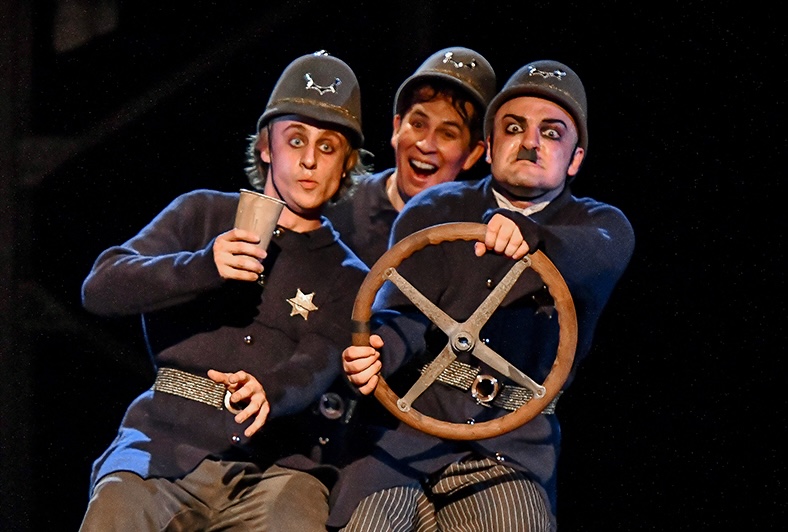Russian Jewry
Theater J's Ari Roth has ever-so-slightly tweaked Chekhov's 'The Seagull' to make it explicitly, inherently Jewish
Oy vey! The Yiddish construction is fun to use and say in English, even though it expresses dismay or exasperation. Yet, just the sound of it adds some levity to the moment.
Similarly, celebrated Russian playwright Anton Chekhov wrote plays intended to straddle the divide between the tragic and the comic — working to draw the funny out of the sad.

The Seagull
(Photo by Stan Barouh)
And to think he wasn’t Jewish.
Take The Seagull. Chekhov’s century-old comedy does not feature any Jewish characters or themes, and yet it is characterized by utter oy veyÂ-edness: replete with angst, existential fervor, romantic pining. The mother-son relationship at the heart of the play is so Oedipal, it could pass for a Jewish stereotype.
And now, in Theater J’s adaptation, it does. To adhere to the theater’s mission to explore Jewish cultural heritage, Theater J’s artistic director Ari Roth ever-so-slightly tweaks the play to make it explicitly, inherently Jewish. More than just create their own shtick, they have created a noteworthy, modernized retelling of this classic tale about youthful yearning and unrequited love. With director John Vreeke and translator Carol Rocamora, Roth mostly sticks to the play’s original 19th century Russian countryside setting, but he incorporates Russian Jews and modern Jewish sensibilities into the mix. The Seagull on 16th Street explores eternal questions about spiritually and symbolism that everyone can toast.
Even without its novel adaptation, Seagull would be a must-see thanks to its altogether winning ensemble cast, led by Naomi Jacobson as Arkadina, a famous Russian actress perpetually anguished about her advancing age as well as her son Treplev (Alexander Strain), an aspiring writer who has yet to make a name for himself. Perhaps in part because he’s never felt appreciated by his mother, Treplev rejects her secular approach to success, in which her Jewish identity is downplayed and her religion itself nonexistent. Treplev announces formation of his own Jewish theater company, and stages a production of his first play at the country estate of his Uncle Sorin (Stephen Patrick Martin) for a gathering of friends and family, most of whom are sycophants to his mother and his mother’s boyfriend, Trigorin (Jerry Whiddon), a Russian literary giant. They effectively laugh Treplev’s play right off the stage, causing Treplev much soul-searching about his future.
Meanwhile, Treplev’s girlfriend Nina (Veronica del Cerro), an aspiring actress, sees star-making potential in Trigorin, and proceeds to naively throw herself at his mercy. The nefarious Trigorin is flattered by her youthful adoration, exploiting it for his own gain.
This adaptation effortlessly incorporates a cappella snippets from modern-day pop songs, especially anguished laments from R.E.M., sung by Jason McCool as Yakov. The rustic staging, by designer Misha Kachman, as well as the howling wind that blows in from an offstage lake during the show’s final act, only adds to the drama. Everything is designed to enhance the play’s central message of love, longing and the lure of youth.
To July 19
Theater J
1529 16th St. NW
$42-$55
800-494-TIXS
www.boxofficetickets.com
The play gets off to a slow start, and it drags ever-so-slightly in its third of four acts. But the resolutely strong cast keeps your attention throughout, teasing out the comedy from all the tragedy. Tessa Klein as Masha fires off several quips, from the new (for this production) ”You’re such a goy” to the classic ”I’m in mourning for my life,” her famous explanation as to why she wears only black. J. Fred Shiffman, as the confident and successful Dr. Dorn, tosses out his fair share of wit and wisdoms and nearly steals the show with a masterful performance.
But the real showstopper is relative newcomer del Cerro as Nina. Del Cerro makes the role, famously played decades ago by Vanessa Redgrave and earlier this decade by Natalie Portman, her own. She’s even more radiant than the script demands. As the show’s symbolic seagull, she soars.
Support Metro Weekly’s Journalism
These are challenging times for news organizations. And yet it’s crucial we stay active and provide vital resources and information to both our local readers and the world. So won’t you please take a moment and consider supporting Metro Weekly with a membership? For as little as $5 a month, you can help ensure Metro Weekly magazine and MetroWeekly.com remain free, viable resources as we provide the best, most diverse, culturally-resonant LGBTQ coverage in both the D.C. region and around the world. Memberships come with exclusive perks and discounts, your own personal digital delivery of each week’s magazine (and an archive), access to our Member's Lounge when it launches this fall, and exclusive members-only items like Metro Weekly Membership Mugs and Tote Bags! Check out all our membership levels here and please join us today!























